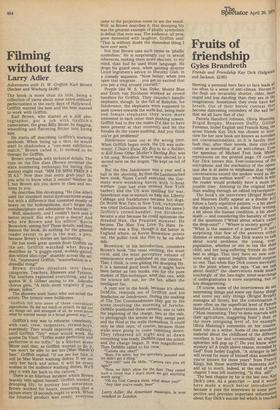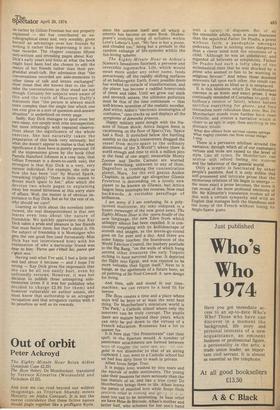Fruits of friendship
Gyles Brandreth
Friends and Friendship Kay Dick (Sidgisiel( and Jackson, £2.95)
Meeting a personal hero face to face leads all too often to a sense of anti-climax. Heroes in the flesh are invariably shorter, older, more stupid and less dazzling than they are in the Imagination. Sometimes they even have bad breath. Out of their heroic context they become distressing reminders of the sad fact that we all have feet of clay.
Pamela Hansford Johnson, Olivia Manning, Brigid Brophy, Maureen Duffy, Gillian Freeman, Isobel English and Francis King, the seven friends Kay Dick has chosen to interview for her new book are known as novelists not conversationalists, so it is hardly the fault that, after their novels, their chit-chat I comes as something of an anti-climax. Even the speeches of Michael Foot look lifeless reproaucea on the printed page. Of course,
Kay Dick knows this. Ever-conscious of the
microphone and the mechanics of the opera' tion she is at pains to emphasise that "these conversations record the spoken word as di5. tinct from the written word" — which is whY the reader would probably have a more enjoyable time listening to the original tapes than wading through an edited troscription.
The book's six interviews (Brigid BrophY and Maureen Duffy appear as a double act) follow a fairly repetitive pattern — a bit about
the subject's youth, a bit about their writing, a bit about the human condition, a bit about
death — and considering the banality of most of the questions ("What about what's called the drop-outs?" / "Where is society going?' ,/ "What is the essence of a person?") it isn t ' surprising that few of the answers either illumine or entertain. Kay Dick wants to talk
about world problems, the young, over population, whether or not to tax the third child, and her long-suffering friends do their
best to oblige. That they have no new sol.u" tions and no special insights should surprise no one. That when Kay Dick comes inevitablY
to the point where she says "Can we talk about death?" the observations made smack touchingly of the late-night inner-searchings of undergraduates is more surprising, but na less disappointing.
Of course, some of the interviewees do 5Y interesting things and some say funny things and some say silly things (Brigid BrophY manages all three), but the conversation is more often on the superficial level of Pamela Hansford Johnson's observations on China ("Most interesting. They've done marvels with
their agriculture, staggering feats") than 011 the more intriguing level of, for example,
Olivia Manning's comments on her trauma
tised role as a writer. Some of the anecdotal material about the childhood of the different novelists is fun and occasionally an elegant
aphorism will pop up (" Do you know what mystery is? A truth above reason, revealed bY
God" from Isobel English, "A stranger in bed
will reveal far more of himself than somebody you've known for three years" from Frarici,s
King), but these worthwhile moments don t add up to much. Indeed, at the end of each chapter I was left muttering, "Is this all?" The best chapter by far is the last one, Ka,YA Dick's own. As a postcript — and it wouw have made a much better introduction because it puts the interviews in some pers' pective and provides important information about Kay Dick's suicide bid which is touched
on earlier by Gillian Freeman but not properly explained — she has contributed an autobiographical essay and, very sensibly, given herself an advantage over her friends by Writing it rather than improvising it into a tape recorder. The chapter contains fifteen well-written and revealing pages about Kay Dick's early years and hints at what the book might have been had she chosen to edit the essays of her friends rather than their preprandial small-talk. Her admission that "the conversations recorded are aide-memoires to other times of talk and letters exchanged" must mean that she knows that to the outsider the conversations as they stand are not enough. Certainly her subjects were aware of this and the truth of Maureen Duffy's statement that "the person is always much more complex than the single line which one can ever give in a sort of question-and-answer situation" is underlined on every page. Sadly, Kay Dick manages to spoil even her own essay, not simply with trite introspection, but more irritatingly with repeated observations about the significance of the whole exercise. She has naturally taken the preparation of this book very seriously, but What she doesn't appear to realise is that what Significance it does have is purely personal. Of all the impressions given by the book (that Pamela Hansford Johnson is a cosy lady, that Gillian Freeman is a down-to-earth one), the strongest is that Kay Dick is a very, very earnest individual. For example, she tells us how she has been 'cut' by Muriel Spark, remarking (rightly) "there is little reason to devote much space to her," after which she devotes two whole pages to explaining away her muted bitterness at this sorry state of affairs. Well, the matter is of obvious importance to Kay Dick, but as for the rest of us, why should we care?
Learning so little about the novelists interviewed, the real disappointment is that one learns even less about the nature of friendship. We quickly appreciate that Kay Dick takes a pride and pleasure in her friends that must flatter them, but that's about it. On the subject of friendship it is Montaigne who gets the one good line (and fortunately Miss Dick has not interviewed him) with his explanation of why a particular friend was dear to him: Parce que c'etait lui; parce que eqtait moi.'
Having said what I've said, I feel a little sad and bad about it because — and I hope I'm Wrong — Kay Dick gives the impression that she can be all too easily hurt, even by unfriendly reviews. However, it was her decision to publish these uninspiring aidememories (even if it was her publisher who decided to charge £2.95 for them) and however vulnerable an author seems, she must know that authorship is an arrogant occupation and that arrogance carries with it its penalties as well as its rewards.



































 Previous page
Previous page